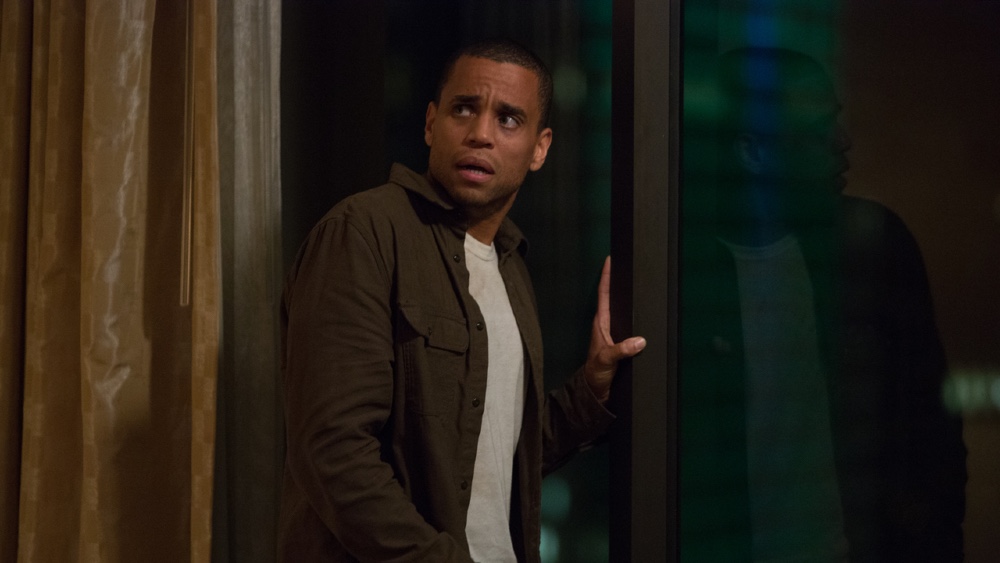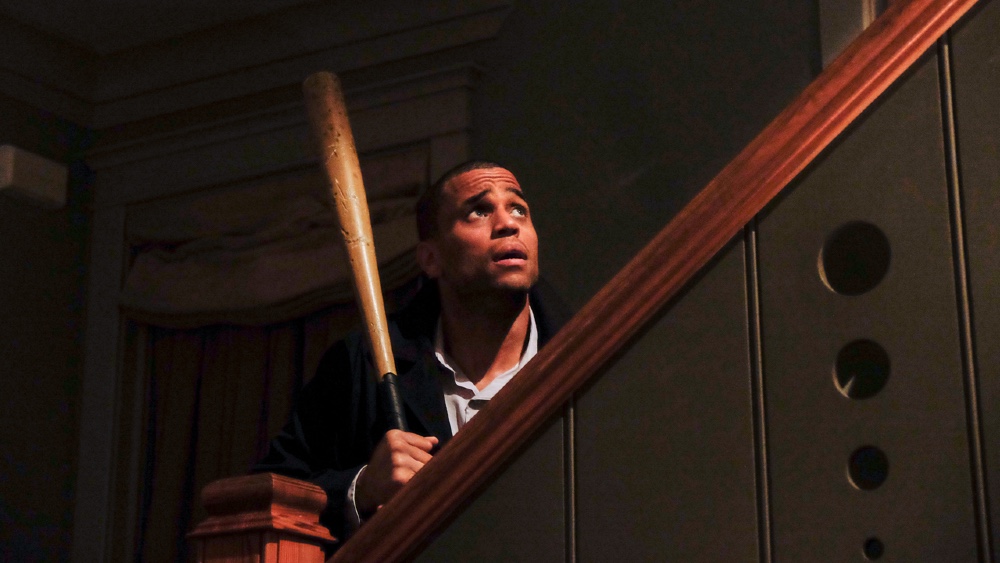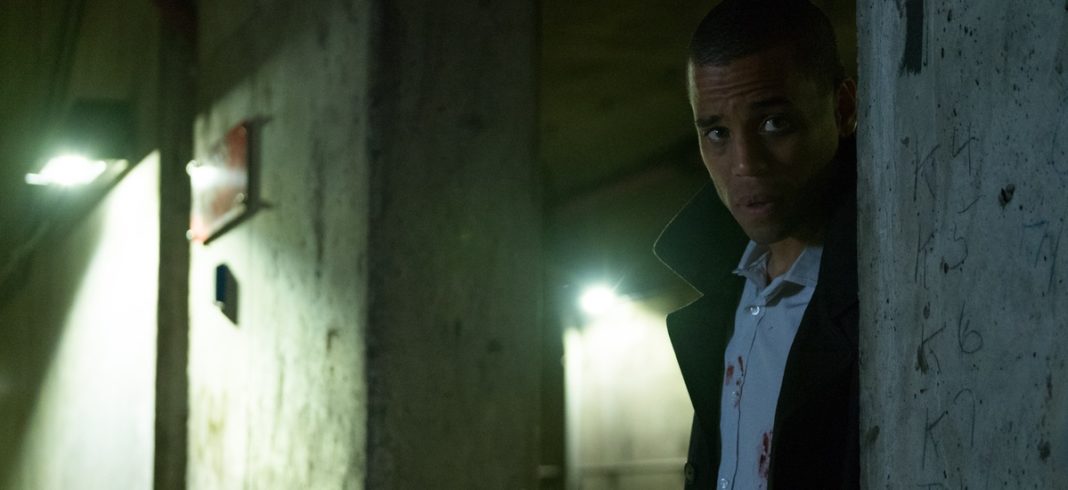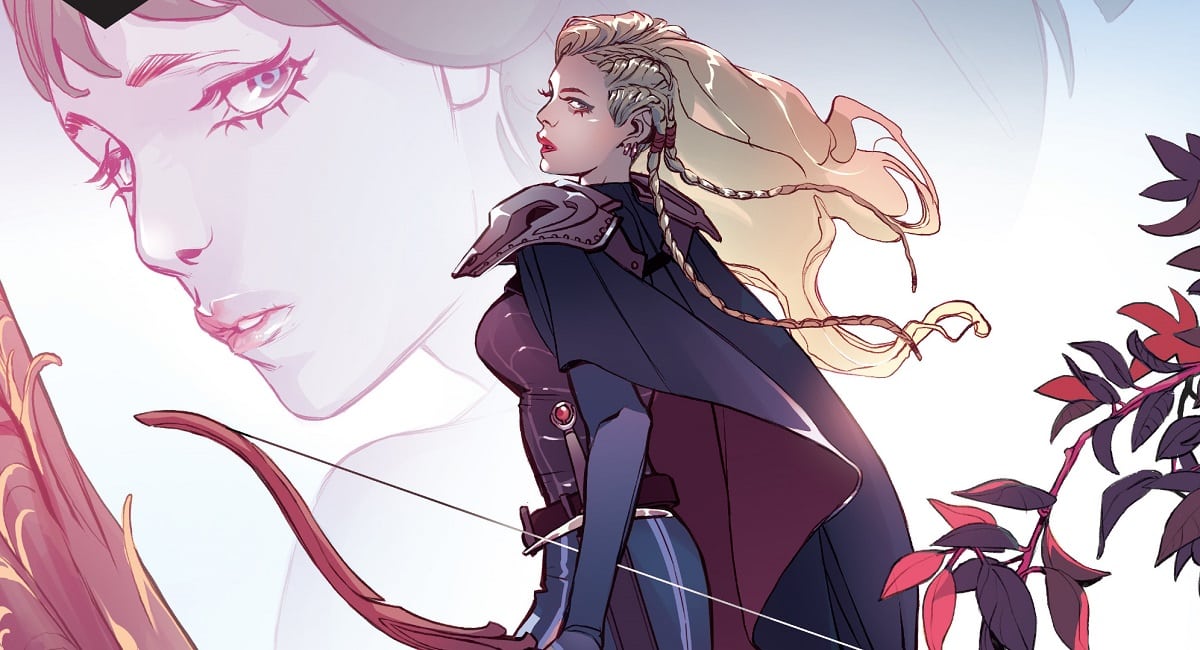Actor Michael Ealy has been working fairly steadily since the “turn of the century” i.e. 2000, appearing in a combination of TV series and movies. In the last couple years, he’s been shifting to leading man thanks to his ongoing collaboration with producer Will Packer.
That partnership has led to Ealy starring and exec. producing David M. Rosenthal’s Jacob’s Ladder, a modernization of the 1990 Adrian Lyne psychological thriller which starred Tim Robbins. Ealy plays Jacob Singer who returns from Afghanistan where he lost his brother and takes a job as a trauma surgeon at a VA hospital. Everything is going well until Jacob runs into a stranger who tells him that his brother is still alive which sends him down a rabbit hole that includes government experiments done on soldiers.
Jacob’s Ladder continues Ealy’s run of genre films, having appeared in Underworld Awakening back in 2012 and in a number of thrillers since then. Earlier this year, Ealy could be seen in Deon Taylor’s domestic thriller The Intruderand he recently reunited with Taylor and Hilary Swank for another thriller called Fatale, which will hopefully come out in the next year.
The Beat got on the phone with Ealy last week for the following interview. Ealy also stars in ABC’s upcoming show based on Greg Rucka’s comic Stumptown, which will premiere on September 25; we spoke about that as well.
THE BEAT: I was a big fan of the original Jacob’s Ladder, and I’ve been pretty excited about this one. I even spoke to Will Packer a few years ago when this was still in the works. You’ve done quite a few movies with Will and another one with [director] David Rosenthal. At what point did it come about that you were going to star in this one as well?
Michael Ealy: The Perfect Guy was released in 2015. We shot it in 2014, and that was the first time that David Rosenthal and I worked together. I got the call from Will Packer, I’d say shortly after… maybe a month or two after Perfect Guy came out, I got the call from Will about Jacob’s Ladder, and I said, “I remember when the movie came out. I was like 17 and I didn’t understand it, and I haven’t watched it since.” I was like, “Send me the script so I can take a fresh approach to it and see if it’s a story I think I want to tell, and secondly, whether or not it needs to be remade.” I don’t think everything needs to be remade. I read the script, and I instantly found a connection to the component of PTSD, and the war in Afghanistan. I thought rather than a documentary about PTSD, because I’ve seen my fair share of those. I don’t know if you’ve ever seen the one James Gandolfini put together (Alive Day Memories – Home from Iraq), but that was pretty incredible. But that one shook me to my core, and it was actually right around the time I was preparing for this one, and I was able to come on as an EP on this project, and when we started talking about directors, I thought David would be ideal. As a cinephile, I knew he knew about the original, and without even discussing it with him, I knew he loved the original, so I spoke to him about it, he said, “I fuckin’ love the original, man. Let me see the script. Let’s do it!” We really had this approach that we wanted to tell… what we both loved about this script was that because it was Afghanistan, it felt current. For some people, Vietnam is like the Civil War. It’s that far in the past, so Afghanistan is much more contemporary and something I think the younger generation be able to relate to. At the same time, what’s kind of amazing about being able to retell this story is that – and this is something I learned from the research I did – PTSD has been around for centuries. It just got the label of PTSD. It was “shellshock”… when talking about the Greek tragedies, it was called “The Madness.” You can find it in any kind of literature that had to do with war, there was PTSD. You realize that this is a common theme that has never gone away and probably never will. It was important to be able to shed light on that, and there’s also, for me, a connection to the Tuskegee Experiment and this idea that the government would run experiments on soldiers is disheartening, to say the least, but at the same time, it’s happened before, so it can happen again.

THE BEAT: Once you decided to do it, was it actually shot in New York at all, or a little bit?
Ealy: No, no, no. We shot it in Atlanta.
THE BEAT: The train stations definitely looked more modern than the original movie, obviously, but I couldn’t tell whether it was New York or not.
Ealy: No, we shot it in Atlanta, and interestingly enough, we shot in the same hospital as Stranger Things, but we shot the movie before Stranger Thingscame out. Stranger Thingshad actually shot in there before we did, in that location, but then we shot it, and then Stranger Things came out, and I was like, “Oh, I totally recognize that hospital. Wow!”
THE BEAT: You’ve played a lot of different roles over the years, so was surgeon already something that was in your wheelhouse?
Ealy: No, I had never played a surgeon before. I had never played a trauma surgeon before. That was a whole different level of consulting that had to happen. I literally had to hang out with a trauma surgeon and find out what that’s like. I wish that upon no one. I don’t care if you’re in a hospital in Detroit or you’re in some third world country in a war, trauma surgeons are… that is probably one of the hardest things you can ever sign up for.
THE BEAT: When you have a new role, do you generally try to meet up with people as part of the research? Is that important for the roles you take?
Ealy: Absolutely. I don’t think you can bring authenticity to any role without doing the proper work, the proper research. You just have to do it.
THE BEAT: Before you started, did you and David sit down and rewatch the original movie? Did you do that at all or had you already decided not to?
Ealy: It’s crazy you ask. David knew it front to back. He had seen it a thousand times, and I was like, “I’m not going to watch it, until it’s over.” I really want to try and go off of this script and get Jacob from there, because I feel like if I watched the movie, I’m going to want to do something that happened in the original. I just know it. It’s osmosis. I’m going to bring some of Tim Robbins to this movie, and I don’t want to do it. Tim did a fantastic job, I’m sure. I want to bring Michael to breathe life into Jacob, that’s what I want to do. When I watched it, after we finished — I watched it about three months later – and I didn’t like it. I started reading reviews, and I wasn’t alone. It got very mixed reviews, and a lot of people felt the way I did, so I waited another three months and maybe a year later, and then watched it again right before we did some reshoots, and caught some of the brilliance of that movie. There is brilliance in that movie. It’s not a perfect movie, but there is some brilliance in that movie, and I think that brilliance is why it became a cult classic. It was obviously never a box office breakout hit.
THE BEAT: I must have just moved to New York when I saw this, but the moment I’ll always remember is when he has to cross the subway tracks. That might be the fear of every New Yorker and also everyone who visits New York, having to cross the tracks. You did a lot of really cool things in the subways for this one, too, but I like the fact this is more dramatic and you can take out the horror elements, and it still works.
Ealy: We tried to make something that was a bit more grounded than the original, and at the same time, we paid homage to the original with some special effects and the gritiness of it and all of that. But we really wanted to tell a little bit of a different story this time around and something that was a bit more tangible.
THE BEAT: You’ve been doing more genre films and the movies you’ve done with Deon Taylor. The Intruder was cool, and I know you’re doing another movie with him called Fatale. Do you generally like genre movies yourself? Is that something you would watch if you had time to go the movies?
Ealy: You know, before I knew they were genre movies, I think I just always felt that they all ask the question “What would you do?” right? What would you do if you were in this person’s shoes? I guess the same thing can be said of a Marvel movie, but it’s a little harder to say that, because you don’t have Spidey-powers, you know what I mean? You don’t have Batman’s money. You don’t know what you’re really going to do as a superhero, and you just live vicariously through them. I think in these movies, in these types of films, it’s relatable to the audience in a way in which they can see themselves actually under these circumstances, and if they have to fight for their life, what would they do differently? What would they do? I think that’s the key to genre films for me, but this one, Jacob’s Ladder, I had no interest in Jacob’s life, because what he goes through is just horrible. It’s fucking horrible. I was so appreciative of my home life, and not having to go to war and suffer from PTSD and the effects it has on your family and all of that stuff. I applaud and I appreciate the soldiers that have made that sacrifice, I really do. I don’t think a lot of them know that this can happen when they go in. I don’t think it’s something you really think about before you go in. Maybe I’m wrong, but I just know that I’m not cut out for it, man. I’m not cut out for it.

THE BEAT: What else are you working on these days? I first met you on the set of the Underworld movie you did in Vancouver, and I think I’ve seen almost all your movies and none of your TV shows.
Ealy: (laughs) Oh, shit…
THE BEAT: I guess I just don’t watch as much TV but you’ve done a ton of it, and that’s getting bigger. Which world are you working in these days?
Ealy: I’m still in both. Obviously, I did Fatale with Deon and now I’m on an ABC show called Stumptown, which is based on a graphic novel. That comes out Sept. 25 on ABC and has Cobie Smulders and Jake Johnston and Tantoo Cardinal and Camryn Manheim, so we got a really good cast, really good story. Different version of storytelling, but yeah, right now I feel like there’s such a fine line between film and television. I feel like some of the best stories are being told in television. I don’t know if you had a chance to see The Haunting of Hill House.
THE BEAT: I have not watched it but I’m a fan of that director, Mike Flanagan.
Ealy: Oh, if you get a chance, watch that one. It’s beyond suspenseful. I was like, “Wow,” and a lot of TV show right now are just extremely cinematic, so it’s a great time.
THE BEAT: I’m interested to know more about Stumptown since this interview is for ComicsBeat, but I’ll be curious to see what that’s about since there are some amazing comics out there, not just superheroes.
Ealy: Yeah, this one was written by Greg Rucka, and we just went to Comic-Con with it, and he’s like a complete legend. I’ve had comic book friends call me and be like, “I’m so glad you’re doing Stumptown, man. I fucking love that novel, man.” It was insane. Greg Rucka is a genius – he’s a legend – and I’m just like, “Yeah, cool.” To me, I read the script and I couldn’t characterize it, so for me, it’s just going to be a challenge, because it’s not a medical drama, it’s not a legel drama, it’s not a cop show. So you know, we’re going to go there with it.
THE BEAT: Was that your first time at Comic-Con?
Ealy: No, it was my third I think.
THE BEAT: Did you go there with Underworld, too?
Ealy: I did. I went with Underworld and I went with another show on FOX four or five years ago called Almost Human.
Jacob’s Ladder opens in select theaters and On Demand on Friday, August 23









Comments are closed.